
In this hypothetical situation, a programmer masquerades as a trade expert in order to share an important message with the newscaster: stop incorrectly using the word “backslash” when you mean “forward slash” (a common error).
There is no actual humor in this comic strip, as it merely serves to point out something that the reader will vehemently agree with. Through a clever psychological trick, the Author is able to use this strong agreement to simulate enjoyment and reverence. This same tactic is used by many major news networks, such as Fox News.

Another very humorous hypothetical situation has been proposed by the Author. He suggests that one could click on the pilot’s seat during the airline ticketing process, thus becoming the pilot and actually flying the plane. He further suggests that this would be an enjoyable experience for the would-be pilot.

The Author has created another hypothetical situation in an attempt to derive humor from an impractical situation based off of a cliché. In this case, the cliché is the common misuse of the word “literally,” and the impractical situation is a man waiting 18 years to retaliate against being embarrassed over this cliché.
Other things you may be able to derive humor from in this strip:
- The crazy man’s hair and beard are very long and unruly.
- In the last panel, the crazy man believes that the non-crazy man has once again misused the term “literally.” But, as it turns out, he actually meant that the crazy man was the craziest person he had met.
- The whole situation is pretty “wacky.”
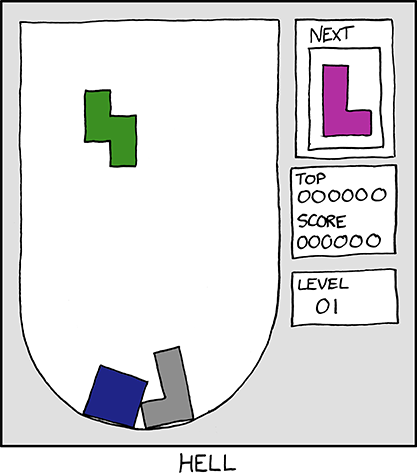
A humorous conceptualization of hell wherein the popular game of Tetris™ is modified with a rounded bottom, making it nearly impossible to score any points, as the necessary geometric alignments cannot be made.
Note: this particular web comic pays homage to this other web comic.

A humorous and quite original observation about the prolific nature of Twitter users, as well as their tendency to put their social network above all else - even personal safety. (The observation being that modern networking technology has made it possible for the news of an earthquake to travel faster than the actual event).
Not satisfied with this witty and fresh commentary - the Author draws it out with some filler in the form of pseudoscience and diagrams. While one would never actually trust the merits of his claims, facts or references, they serve as a playful distraction on the road to the punchline.
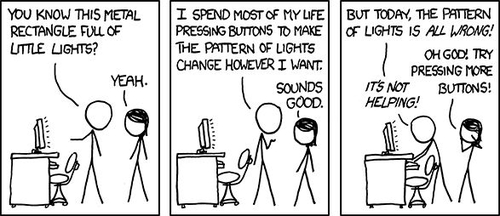
Wherein the Author summarizes all of computing as a life wasted on mashing the buttons of a glowing box.
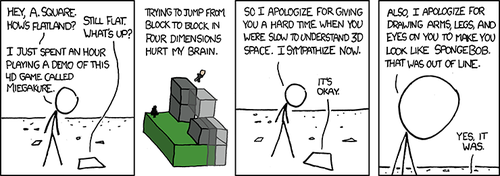
“A. Square” is the pseudonym used by the author of Flatland, an 1884 satirical novella that uses the concept of dimensionality to mock victorian society. The yet-to-be-released game Miegakure is based partially off of Flatland, as it too plays with the concept of dimensions and transporting between them.
The Author of this comic strip has made a couple of jokes while referencing both of these concepts. The first joke occurs when a two-dimensional character asks, “What’s up?”, as he would truly have no concept of “up”. The second of the two jokes is that the Author drew on A. Square in order to make him look like Spongebob Squarepants, a character from a children’s cartoon show. This last joke is funny because a cartoon character is two dimensional, much like the square.
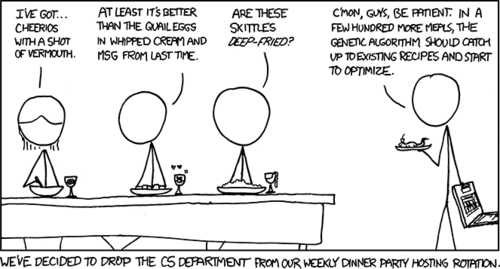
Background: Genetic Algorithms are methods for finding solutions to computational problems that are modeled after evolution. They tend to start by selecting a series of random possible solutions and testing them against a set problem, then testing how effective the given solution (or component thereof) was. Upon each completion, the best solutions are modified or “mutated” using the collected results and the process begins again. This repeats numerous times with the end goal of removing all but the best possible solution to the problem.
The Author believed that it would be humorous to take the scientific concept of genetic algorithms and transpose it onto a common life task - cooking. As is shown in the comic strip, the computer science students have decided to use a form of genetic algorithm to randomly combine ingredients to create the ultimate recipe for the dinner party. It’s funny because this leads to very peculiar food combinations that most people would not enjoy consuming.
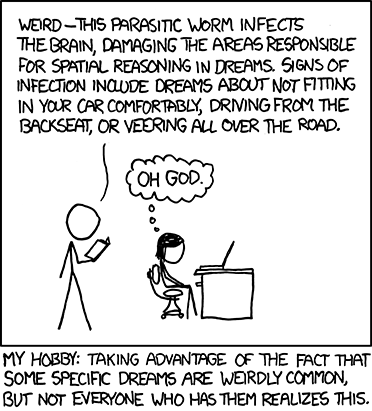
Another in the Author’s series of “My Hobby” web comics, wherein he describes a hypothetical action that is zany and/or clever for comedic value.
In this edition, he uses a book of common dreams to trick a female into believing that she has a debilitating parasite in her brian. He does this by reading aloud a specific dream, but claims that this dream is a symptom of the parasite. The female believes him and becomes worried.
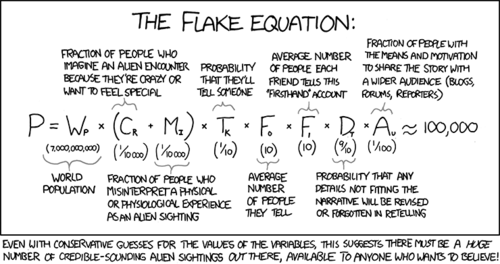
Today’s comic revolves around a fictitious and humorous equation, “The Flake Equation.” The name is, of course, a pun on the famous Drake Equation - an equation created by Frank Drake in the early ’60s that attempts to produce the number of extraterrestrial civilizations in the Milky Way with which contact may be possible.
While the real equation contains a mixture of hypothesized numbers and probabilities about the science of our galaxy, the Author’s comical version uses seemingly arbitrary numbers and probabilities about the people who claim to have seen an alien.
The joke here is that the if Drake Equation attempts to find how many alien civilizations we may actually contact, why not just use the “Flake” equation to find the number of humans who may at some point claim to have made such contact? (since it’s the same thing)
10.










